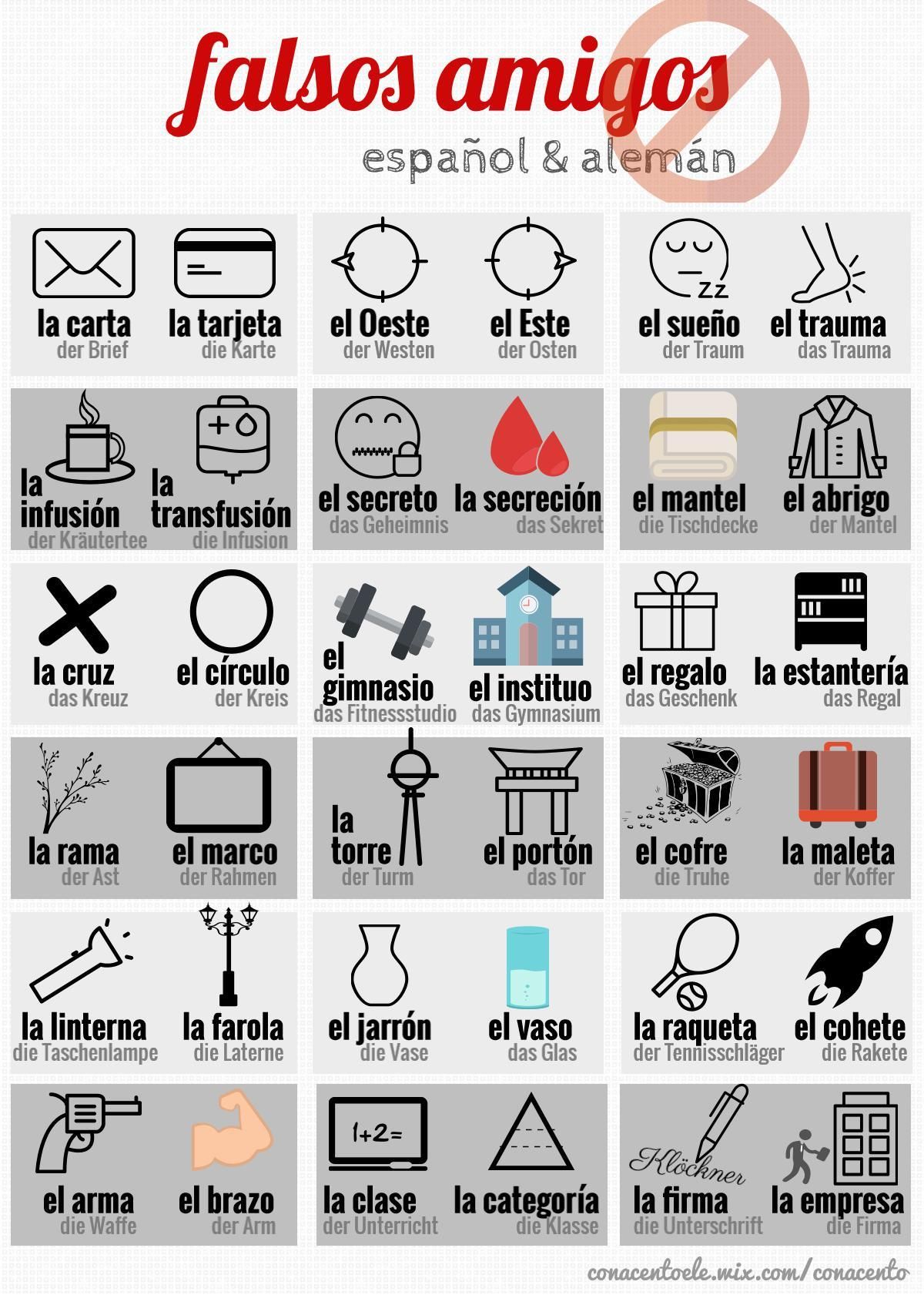False cognates list english spanish pdf
Today we’re going to explore the world of Spanish-English partial cognates. Back in our first lesson, we talked about the difference between cognates and false friends.
Near perfect cognates are words which look similar in both languages and mean the same thing, but require a simple formula to convert from English to Spanish. False cognates , also known as “false friends”, are words that are spelled the same or similar, but have a completely different meaning.
Many translated example sentences containing “false cognates” – Spanish-English dictionary and search engine for Spanish translations.
Remember, a Spanish-English cognate is a word that is spelled or pronounced almost the same in Spanish as it is in English. Using this knowledge and the prefixes above, match the following words by dragging and dropping the English cognates onto their Spanish counterparts.
False Cognates Os falsos cognatos ou false friends são palavras que possuem ortografias semelhantes, mas You must watch that movie with English subtitles , so you’ll practice your English. h) Maria goes to a particular school near her house. Maria goes to a private school near her house. i) My new girlfriend is a stranger . She was born in Italy and she came to Brazil last month. …
Cognates are words that are similar, or even identical, in two languages. Spanish and English share many of these. For example: capital/capital, banana/banana, restaurant/restaurante, impossible/imposible, etc.
For example, a native Spanish speaker may read the English word “embarrassed” and draw an association to the Spanish word “embarazada,” which translates to “pregnant” in English. Recognizing false cognates spares ESL students from confusing or …
Using Cognates in Spanish/English Bilingual Classrooms Language Matters Conference Ingrid Colón, M. Ed. Loyola University Chicago icolon1@luc.edu . Workshop Objectives Explain the benefits of explicitly teaching cognates in dual language classrooms Discuss next steps to teach cognates in your classroom . My goal as a Dual Language Teacher To promote academically bilingual and biliterate
The most common cognates between English and Spanish are derived from Latin words. On the other hand, the language learner’s much-loathed false cognate looks like it …
1001 Spanish Words You Already Know A Guide To English-Spanish Cognates . Perfect Cognates Here is the list of perfect English-Spanish cognates: Spanish English Actor Actor Admirable Admirable Agenda Agenda Alcohol Alcohol Altar Altar Animal A nimal Area Area Artificial Artificial Auto Auto Balance Balance Bar Bar Base Base Bridge Bridge Brutal Brutal Cable Cable Café Cafe Canal …
false cognates Spanish translation – Linguee

Cognates (English I Reading) Texas Gateway


English/Spanish Cognates Transportation
– zodiac the shocking true story pdf




–


English/Spanish Cognates Transportation
false cognates Spanish translation – Linguee
Remember, a Spanish-English cognate is a word that is spelled or pronounced almost the same in Spanish as it is in English. Using this knowledge and the prefixes above, match the following words by dragging and dropping the English cognates onto their Spanish counterparts.
For example, a native Spanish speaker may read the English word “embarrassed” and draw an association to the Spanish word “embarazada,” which translates to “pregnant” in English. Recognizing false cognates spares ESL students from confusing or …
1001 Spanish Words You Already Know A Guide To English-Spanish Cognates . Perfect Cognates Here is the list of perfect English-Spanish cognates: Spanish English Actor Actor Admirable Admirable Agenda Agenda Alcohol Alcohol Altar Altar Animal A nimal Area Area Artificial Artificial Auto Auto Balance Balance Bar Bar Base Base Bridge Bridge Brutal Brutal Cable Cable Café Cafe Canal …
The most common cognates between English and Spanish are derived from Latin words. On the other hand, the language learner’s much-loathed false cognate looks like it …
False Cognates Os falsos cognatos ou false friends são palavras que possuem ortografias semelhantes, mas You must watch that movie with English subtitles , so you’ll practice your English. h) Maria goes to a particular school near her house. Maria goes to a private school near her house. i) My new girlfriend is a stranger . She was born in Italy and she came to Brazil last month. …
54 Spanish Verb Cognates to Put in Your Wheelhouse
Near perfect cognates are words which look similar in both languages and mean the same thing, but require a simple formula to convert from English to Spanish. False cognates , also known as “false friends”, are words that are spelled the same or similar, but have a completely different meaning.
Spanish-English Partial Cognates The Language Island
The most common cognates between English and Spanish are derived from Latin words. On the other hand, the language learner’s much-loathed false cognate looks like it …
54 Spanish Verb Cognates to Put in Your Wheelhouse
false cognates Spanish translation – Linguee
Near perfect cognates are words which look similar in both languages and mean the same thing, but require a simple formula to convert from English to Spanish. False cognates , also known as “false friends”, are words that are spelled the same or similar, but have a completely different meaning.
54 Spanish Verb Cognates to Put in Your Wheelhouse
false cognates Spanish translation – Linguee
Cognates (English I Reading) Texas Gateway